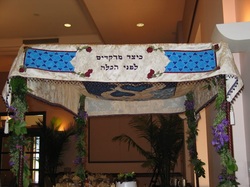Our Chuppah

Our chuppah was made with love by Josh's mom, Marianne Bob, and a family friend, Miriam Shazeer. It was made in the summer of 2003 for the wedding of Shira and Ken (Miriam's daughter and son-in-law). Since then, it has been used two more times for Shazeer family weddings, and Josh has known that it would be waiting for him to use, when the time came.
Many of you know that Marianne passed away on November 1, 2008. We feel truly blessed and deeply moved to be able to stand with Rachel's parents and Josh's dad under the chuppah that Marianne made.
Many of you know that Marianne passed away on November 1, 2008. We feel truly blessed and deeply moved to be able to stand with Rachel's parents and Josh's dad under the chuppah that Marianne made.
What is a chuppah?
The marriage ceremony is conducted under a marriage canopy, known in Hebrew as a chuppah (literally, "covering"). It consists of a square cloth, usually made of silk or velvet, and supported by four poles or held by friends close to the bride and groom. The chuppah symbolizes the new home that the bride and groom are creating. It is open on all four sides to signify that their home should be a place where they welcome guests.
What does our chuppah say?
The Hebrew on the chuppah reads:
Kol mitzhalot chattanim michupatam, un'arim mimishteh neginatam - this is from the last of the Sheva Brachot, the seven wedding blessings. The entire blessing thanks God for creating joy and gladness, groom and bride, rejoicing and love - and expresses the desire that there should always be the sounds of a wedding celebration in the streets of Jerusalem.
Ikh on dir un du on mir iz via klyomke on a tir - this is a line from a Yiddish love song which means "I without you and you without me is like a doorknob without a door". Since learning that this line is on the chuppah, Rachel has taken to calling Josh her "door".
Keitzad merakdim lifnei hakalah - this is a line from the Talmud, tractate Ketubot (which, as it happens, is one of the favorite pieces that Rachel studied in Jerusalem during rabbinical school). It roughly translates to "this is how you dance before a bride" (long story - but ask her sometime, cause it's a good one!). These words are often sung to a joyous tune at weddings...or, depending on your classmates, in Talmud class.
Mitzvah gedolah l'hiyot b'simcha, which means, "it is a great mitzvah to be joyous". We should take this line literally and spend the day b'simcha, in joy - which is also our plan for our marriage.
Kol mitzhalot chattanim michupatam, un'arim mimishteh neginatam - this is from the last of the Sheva Brachot, the seven wedding blessings. The entire blessing thanks God for creating joy and gladness, groom and bride, rejoicing and love - and expresses the desire that there should always be the sounds of a wedding celebration in the streets of Jerusalem.
Ikh on dir un du on mir iz via klyomke on a tir - this is a line from a Yiddish love song which means "I without you and you without me is like a doorknob without a door". Since learning that this line is on the chuppah, Rachel has taken to calling Josh her "door".
Keitzad merakdim lifnei hakalah - this is a line from the Talmud, tractate Ketubot (which, as it happens, is one of the favorite pieces that Rachel studied in Jerusalem during rabbinical school). It roughly translates to "this is how you dance before a bride" (long story - but ask her sometime, cause it's a good one!). These words are often sung to a joyous tune at weddings...or, depending on your classmates, in Talmud class.
Mitzvah gedolah l'hiyot b'simcha, which means, "it is a great mitzvah to be joyous". We should take this line literally and spend the day b'simcha, in joy - which is also our plan for our marriage.